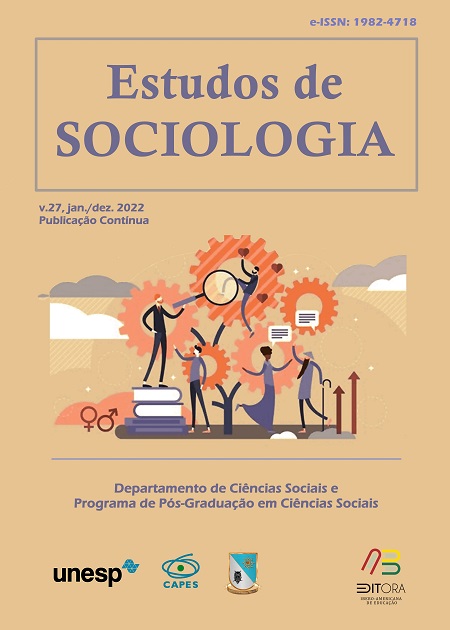Interfaces between Max Weber and Pierre Bourdieu in class analysis
DOI:
https://doi.org/10.52780/res.v27i00.15216Keywords:
Class, Socialization, Max Weber, Pierre BourdieuAbstract
This article focuses on similarities and disagreements between Max Weber and Pierre Bourdieu in class analysis. For this, four themes are discussed: the Weberian contribution regarding types of social stratification, notably class and status; the class analysis presented in The Protestant Ethic and the Spirit of Capitalism, focusing on dispositions related to competitive capitalism; the Bourdieusian proposal on class positions, resulting from expressive procedures and differential access to capital species; and the incorporation of habitus based on socialization experiences.
Downloads
References
ARCHER, P.; ORR, R. Class identification in review: past perspectives and future directions. Sociology Compass, v. 5, n. 1, p. 104-115, 2011.
BARBALET, J. Weber, passion and profits: “The Protestant Ethic and the Spirit of Capitalism” in context. New York: Cambridge University Press, 2008.
BENSON, R. News media as a ‘journalistic field’: what Bourdieu adds to new institutionalism, and vice versa. Political Communication, v. 23, n. 2, p. 187-202, 2006.
BIDET, J. Questions to Pierre Bourdieu. Critique of Anthropology, v. 4, n. 13, p. 203-208, 1979.
BOTTERO, W. Class identities and the identity of class. Sociology, v. 38, n. 5, p. 985-1003, 2004.
BOURDIEU, P. O poder simbólico. Rio de Janeiro: Bertrand Brasil, 1989.
BOURDIEU, P. Meditações pascalianas. Rio de Janeiro: Bertrand Brasil, 2001.
BOURDIEU, P. A distinção: crítica social do julgamento. Porto Alegre: Zouk, 2007a.
BOURDIEU, P. A economia das trocas simbólicas. São Paulo: Perspectiva, 2007b.
BOURDIEU, P. Razões práticas: sobre a teoria da ação. Campinas: Papirus, 2011.
BOURDIEU, P. O senso prático. Petrópolis, RJ: Vozes, 2013.
BOURDIEU, P.; SCHULTEIS, F.; PFEUFFER, A. With Weber against Weber: in conversation with Pierre Bourdieu. In: SUSEN, Simon; TURNER, Brian. The legacy of Pierre Bourdieu: critical essays. London: Anthem Press, 2011. p. 111-124.
CHAN, T.; GOLDTHORPE, J. Class and status: the conceptual distinction and its empirical relevance. American Sociological Review, v. 72, p. 512-532, 2007.
DENHARDT, R.; JEFFRESS, P. Social learning and economic behavior: the process of economic socialization. The American Journal of Economics and Sociology, v. 30, n. 2, p. 113-125, 1971.
GOLDTHORPE, J. Back to class and status: or why a sociological view of social inequality should be reasserted. Revista Española de Investigaciones Sociológicas, v. 137, p. 201-215, 2012.
GROSSEIN, J.-P. Peut-on lire en français ‘L’Éthique protestante et l’espirit du capitalism’? European Journal of Sociology, v. 40, n. 1, p. 125-147, 1999.
HENRY, P. Social class, market situation and consumers’ metaphors of (dis)empowerment. Journal of Consumer Research, v. 31, n. 4, p. 766-778, 2005.
HÉRAN, F. La seconde nature de l'habitus: tradition philosophique et sens commun dans le langage sociologique. Revue Française de Sociologie, v. 28, n. 3, p. 385-416, 1987.
JOPPKE, C. The cultural dimension of class formation and class struggle: on the social theory of Pierre Bourdieu. Berkley Journal of Sociology, v. 31, p. 53-78, 1986.
KEMPER, T. References groups, socialization and achievement. American Sociological Review, v. 33, n. 1, p. 31-45, 1968.
LAVAL, C. La “cage” de Weber”. Temporel: Revue littéraire et artitisque. 2006. Disponível em: http://temporel.fr/La-cage-de-Weber. Acesso em: 27 jan. 2020.
NASH, R. Bourdieu, ‘habitus’, and educational research: is it all worth the candle? British Journal of Sociology of Education, v. 20, n. 2, p.175-187, 1999.
PETERS, G. Bourdieu em pílulas (5): a teoria dos campos. Que Cazzo, 2006. Disponível em: http://quecazzo.blogspot.com.br/search/label/Bourdieu?updated-max=2016-05-26T12:48:00-03:00&max-results=20&start=3&by-date=false. Acesso em: 29 out. 2016.
SELL, C. Max Weber and the debate on social classes in Brasil. Sociologia & Antropologia, v. 6, p. 351-382, 2016.
SILVA, E. Unity and fragmentation of the habitus. The Sociological Review, v. 64, p. 166-183, 2016.
SPENCER, M. The Social Psychology of Max Weber. Sociological Analysis, v. 40, n. 3, p. 240-253, 1979.
SWEDBERG, R. The Max Weber dictionary: key words and central concepts. Stanford: Stanford University Press, 2005.
WACQUANT, L. Poder simbólico e fabricação de grupos: como Bourdieu reformula a questão das classes? Novos Estudos, v. 96, p. 87-103, 2013.
WEBER, M. Classe, Estamento e Partido. In: GERTH, Hans; WRIGHT MILLS, Charles (orgs.). Max Weber: ensaios de sociologia. Rio de Janeiro: LTC Editora, 1982. p. 11-228.
WEBER, M. A ‘objetividade’ do conhecimento nas ciências sociais. In: COHN, G. (org.). Sociologia: Max Weber. São Paulo: Editora Ática, 2003. p. 79-127.
WEBER, M. A ética protestante e o “espírito” do capitalismo. São Paulo: Companhia das Letras, 2004.
WEBER, M. Economia e Sociedade: fundamentos da sociologia compreensiva. Brasília: Editora da Universidade de Brasília, 2012.
WEININGER, E. Foundations of Pierre Bourdieu’s class analysis. In: WRIGHT, E. (org.). Approaches to class analysis. Cambridge: Cambridge University Press, 2005. p. 82-118.
Published
How to Cite
Issue
Section
License

À revista Estudos de Sociologia ficam reservados os direitos autorais pertinentes a todos os artigos nela publicados.
Os artigos publicados e as referências citadas na revista Estudos de Sociologia são de inteira responsabilidade de seus autores.
A Estudos de Socilogia utiliza a licença https://creativecommons.org/licenses/by/4.0/ (CC BY), que permite o compartilhamento do artigo com o reconhecimento da autoria.



